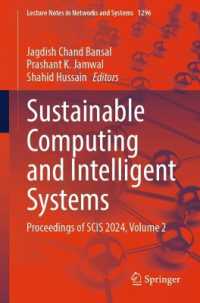Full Description
This incisive work explores the multifaceted struggles of graduate students, confronting burnout, political complexity, and societal crises like COVID-19 epidemic, racism, homophobia, transphobia, patriarchy, white supremacy, xenophobia, and ableism. The mass exodus of workers during the Great Resignation in the United States left many grappling with unemployment, debt, and existential uncertainty, feeling devalued and alienated in academic environments. The RACE Mentoring-Health and Spirituality group emerged as a pivotal initiative, providing essential support in the face of these challenges. The book highlights the critical issue of declining enrollment and completion rates in graduate programs leading to a staffing crisis in higher education. Students from marginalized communities are disproportionately impacted. In response, resilient students have formed supportive networks, showcasing their ability to adapt and thrive despite adversity. This volume of the RACE Mentoring series focuses on these students' survival strategies, self-care techniques, and insights into healing both personally and professionally. The contributors, sharing their diverse experiences, offer practical advice for navigating challenging landscapes. This work serves as a comprehensive guide for healing, growth, and finding inspiration amidst adversity, symbolizing a beacon of hope and resilience for those facing similar challenges. It is a testament to the power of community and perseverance in overcoming significant obstacles.
Contents
Acknowledgments.
Introduction: Candle Sticks in the Dark; Aaron Griffen.
Chapter 1. Talking It Out: A Dialogue For Healing; Neeraja N. Panchapakesan and Narke J. Norton.
Chapter 2. Clinical Practice as Contemplative Practice and a Force for Liberation; Nancy K. Lee.
Chapter 3. From the Lens of (In)visibility: A Photovoice Inquiry into How Community Colleges Can Advance Filipino/a/x American Student Resilience in a COVID-era; Rangel Velez Zarate.
Chapter 4. Proactively Equipping Self and Community With Navigational Tools To Disrupt Othering Within Higher Education; Tomiko D. Ball.
Chapter 5. Trauma-Sensitive, Culturally Sustaining, Compassion-Based Well-Being Practices For Graduate Students of Minoritized Identities; Mindith R. Rahmat.
Chapter 6. Are You Being Prepared? Oppositional Cultural Practice - Healing Yourself While Healing the World; Kim E. Clark.
Chapter 7. Filling Voids and Finding Voice Through Contemplative Practices: Healing in Harmony With the Blossoms of Burnout, Grief, and Trauma; Brandon Lim.
Chapter 8. Guns, Gardens, and Pedagogies for the End of the World; Jacob C. Y. Lacuesta.
Chapter 9. (W)Rite of Passage: A Narrative Musing of Healing in Academic Writing Spaces on the Journey to Doctoral Candidacy; Ashley Watson.
Chapter 10. Accessing the Self: A Journey to Healing; R Hosang-Alleyne.
Chapter 11. Making a Case for Self-Compassion as Core Curriculum in Law School; Helene Louise Taylor.
Chapter 12. Embodied Learning — A Mindfield: Lessons From Interpersonal Neurobiology, Polyvagal Theory, and Trauma, at Ulster University Law School; Mary O'Rawe.
Chapter 13. Career Transitioning with Mind, Body, And Spirit During COVID-19 Pandemic; Felix Quayson.
Chapter 14. Black Mother Wisdom to Graduate Students on the Margins; Martez Files.
Epilogue, A letter From the Editor; Richard D. Williams.
About the Authors.








